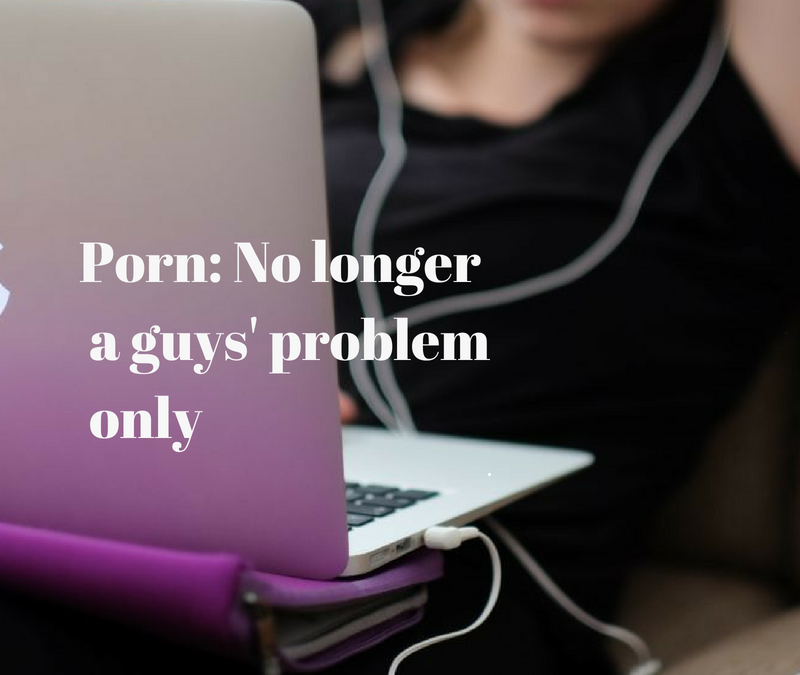
by Lucy | Jun 13, 2018 | biblical counseling, Counselor Resources, emotions, relationships, thoughts |
Women and porn: pornography is not a guys’ problem only. It’s growing exponentially among women, including Christians. In fact, every week or two I counsel yet another woman who struggles with porn.
Skewed Statistics
Truth be told, the statistics on women and porn use fail to tell the full story.
Click & Tweet!
Conservatively, one in five women and girls consume porn. The problem with the numbers starts with defining pornography. Yes, porn includes explicit photos and video. This is hard-core pornography. But there’s other forms!
What about erotica like the 50 Shades of Grey novel? Or how about racy romance novels? Or a Victoria’s Secret catalog? And does sexual fantasy count? Yes, yes, a hundred times yes.
In the words of author-blogger Jessica Harris, a former porn addict:
Pornography isn’t just stored on a computer or found in the pages of a magazine. It buries itself in the mind as memories. In some ways, your own body can serve as a source of pornography.
You may find this blog post uncomfortable to read. Perhaps you’ve already clicked close (and aren’t reading this now). Maybe you even unsubscribed. 🙁 But this topic is essential to know: Your daughters and granddaughters run into pornographic enticements. Every. Single. Day.
Generation Gap!
When it comes to women and porn, there’s a huge difference in porn use and age. Blame the Internet and smart phones.
Says Harris:
Walk into a room with a multi-generational group of men, and you can pretty much assume that the stats on male porn use are going to hold true throughout the generations in the room. Sure, the Baby Boomers grew up on Playboy and the Millennials grew up on smart phones, but still there’s this idea that pornography has been an issue for men for generations.
That is not the case for women.
If I walk into a room with a multi-generational group of women, my first and foremost concern is always to bridge the gap. Because the Baby Boomer women grew up in a time when pornography wasn’t really accessible to them. Nor was it made with them in mind. Their husbands might have been slinking around with magazines stuffed in brown paper bags, but they were not.
Millennial women, on the other hand, came of age at the time of the internet. Not only could we stumble upon a man’s porn stash, now we could access new content all on our own.
Click & Tweet!
Videos even. Without having to subscribe to the adult channels on cable.
Here’s her full post on what the statistics are NOT telling you about women and porn.
Change Is Coming
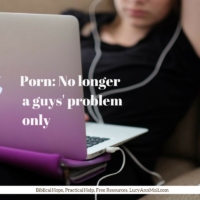 If you hope to gather information about women and porn, you might Google “women and porn” or choose a variation: porn use among women, statistics on women addicted to porn, and so forth. And you’ll get very few hits.
If you hope to gather information about women and porn, you might Google “women and porn” or choose a variation: porn use among women, statistics on women addicted to porn, and so forth. And you’ll get very few hits.
But this is changing.
Among the few resoures is Heath Lambert’s podcast on “Women and Pornography.” You can hear the podcast or read the transcript. There have been a few chapters in biblical counseling books and a booklet or two. I hope to write a book on this subject, God willing. I have a heart for women hooked on porn. Even though it isn’t my story — anxiety and panic attack is part of mine — porn had its hooks in my brother and figures into his binge drinking and also his death. But that’s a story for another time.
Conference Talk on Women and Porn
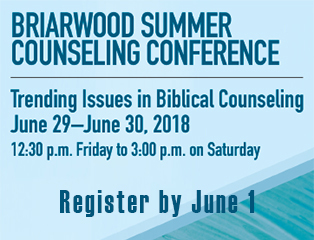 At the end of June I have three talks at Briarwood Summer Counseling Conference: “Trending Issues in Biblical Counseling.” One talk is on self-injury (i.e., cutting and other forms of self-mutilation). And another is on freedom from panic attacks. The third is “Breaking the Bondage of Pornography” (a women only talk). There’s a similar talk for pornography and men.
At the end of June I have three talks at Briarwood Summer Counseling Conference: “Trending Issues in Biblical Counseling.” One talk is on self-injury (i.e., cutting and other forms of self-mutilation). And another is on freedom from panic attacks. The third is “Breaking the Bondage of Pornography” (a women only talk). There’s a similar talk for pornography and men.
I am so happy that I get to speak to female counselors on this topice. With the explosion of internet availability, an ever-increasing number of women are seeking help with porn/masturbation. They often see no way out and have deep guilt and shame. Click here to see the schedule.
Counseling Hearts to Hope,


by Lucy | May 24, 2018 | biblical counseling, emotions
New heart, new desires, new life — you probably know the God “will give you the desires of your heart” verse in the bible. But what does it mean? This article by guest writer Deborah Smith, which appeared first here on Reviving Your Heart, tells a story of we all need to hear. Her story is used with permission. Part 2 in a 3-part series. Here’s part 1.
Consider these three beautiful truths:
- Christians have new hearts.
- Christians have new desires.
- And Christians have new life!
Last time we heard Deborah’s story of overcoming addiction. Now let’s look at developing new desires!
New Desires
Delight yourself in the LORD, and he will give you the desires of your heart (Ps. 37:4).
Delight means to be pleased greatly, captivated, charmed, thrilled. Does that describe your relationship with Christ?
The fruit of being captivated, greatly pleased, charmed, and thrilled by Him is that He will actually give you the things you desire.
Click & Tweet!
You will want new things . . . godly things . . . things that are consistent with the new person that the Holy Spirit is crafting.
We will want things that the Lord would be pleased to give us.
That doesn’t mean we won’t ever be tempted with fleshly desires, because we will—we are still sinners. But the deepest desire of our heart will be to please the Lord, so we will war against our flesh that wants otherwise. We will resist the devil until he flees (James 4:7).
You Hate the Things You Used to Love
Beloved, we are walking with Jesus now. We are “dead to sin” and have different desires. What a beautiful reality—that as a Christian, we are dead to things that we used to live for. Romans 6:10–11 says,
The death he died he died to sin, once for all, but the life he lives he lives to God. So you also must consider yourselves dead to sin and alive to God in Christ Jesus.
Oh, I hope you get that! Jesus paid it all, all to Him we owe!
Click & Tweet!
So when the enemy tempts you with your old sin of choice, remember that “you are dead to that.”
When I stopped smoking cigarettes thirteen years ago, I remember a good friend telling me that if I find myself thinking, I want a cigarette, that I should simply say to myself, That’s crazy, you don’t smoke! Why would I want a cigarette if I don’t smoke?
Likewise, why would you want that sin when you are dead to that? Again, we are in a process, we will still battle ungodly desires. So we are to be careful to “make no provision for sin.” And we fight, knowing that the power that is in us enables us to “want” it without giving into that desire. We are now free!
New Life
If our hearts are new, and we now want new things, and we are doing new things— that equates to new life, loved ones!
What shall we say then? Are we to continue in sin that grace may abound? By no means! How can we who died to sin still live in it? Do you not know that all of us who have been baptized into Christ Jesus were baptized into his death? We were buried therefore with him by baptism into death, in order that, just as Christ was raised from the dead by the glory of the Father, we too might walk in newness of life (Rom. 6:1–4).
This new life is something that we have to participate in. It’s a gift we have been given, but we must live it out. Even though the good work has begun, we are in a maturation process and it takes time to grow.
At the moment of conversion, the Holy Spirit, who is our helper, came to live within us. He is the source of our power. But we must “be sober-minded; be watchful. Your adversary the devil prowls around like a roaring lion, seeking someone to devour” (1 Peter 5:8).
You Are God’s Workmanship!
Beloved, if you don’t get anything else, please get this: You and I are “his workmanship, created in Christ Jesus for good works, which God prepared beforehand, that we would walk in them” (Eph. 2:10). Do you see that? God’s workmanship . . . we are something that God is preparing, shaping and molding for His purposes.
In 1 Corinthians 6:9–10, the apostle Paul launches into a list of sins that characterize the life of one who is not saved—called the unrighteous—and in verse 11, he says this:
And such were some of you. But you were washed, you were sanctified, you were justified in the name of the Lord Jesus Christ and by the Spirit of our God.
We are not supposed to dwell on or glorify our sinful past, but I believe that God highlights those sins and reminds us that we were once slaves to those things for a reason.
WATCH for Part 3 in this 3-part series. You’ll come to understand that you need not life in the past! Be sure you get it — subscribe to my blog!
Counseling Hearts to Hope,


by Lucy | Apr 12, 2018 | biblical counseling, emotions
Learning to trust again again is difficult, isn’t it? But, in God’s strength, you can trust someone who has cut you deep.
In this practical article, you’ll learn three main things:
- Losing trust in someone is hard.
- Learning to trust again is possible!
- Developing a mindset to trust is essential.
But there’s a caveat: In certain circumstances, it would not be wise to trust a person who has hurt you. One example is trusting a physically abusive husband and another is trusting a child abuser UNLESS God has done a transforming work in their heart and they have proven themselves as trustworthy over time. This change comes through true repentance. Have you known someone who has truly changed?
Losing Trust Feels Like Death
Doesn’t losing trust in someone feel like death?
Click & Tweet!
Maybe your husband took up with another woman. Perhaps a coworker disparaged your good name? Maybe a neighbor molested your child. Or perchance your pastor fell like into sexual sin like so many others, creating pain and disorder in the church as a whole.
Deep hurt leading to lost trust is beyond sad. It’s tragic and wrong, and you hurt.
Click & Tweet!
Indeed, you trusted these people, right? Then they did something you never thought they’d do. And chances are you feel angry. Anger is a normal emotional response to hurt.
Among the many counselees who’ve shared their painful stories with me, two stand out:
- Debbie (not her real name) is married to a pastor who spent after-hours time with a young lady in the congregation. Well, you know how it goes. He felt desired and important and sexy when he was with her. They crossed emotional and sexual boundaries. The church fired the wayward pastor. and Debbie seethed. He broke trust.
How could he do this to our family? How could he do this to me and the kids? she asked, pain etched on her face. I don’t know if I can ever trust him again.
- Mara (not her real name) was 5 when a “grandfatherly” neighbor took notice of her, inviting her to come over and play. Well respected by her parents, he began touching her. At first, the touch a quick hug, but over the years, it progressed to oral sex. When Mara came to counseling in her early 30s, she wasn’t sure if she could ever trust a man, even God. Learn to trust again seemed impossible.
But God healed their hurts. And He can heal yours.
Even though I walk through the valley of the shadow of death,
I will fear no evil, for you are with me. Psalm 23:4a
Yes, You Can Trust Again!
Trusting again is a warm spring day. Purple crocuses push through winter’s dreariness. A robin sings cheerful melodies. You look up and sense good change coming.
In their world of hurt, often my counselees are making sense of God’s goodness. God questions zip through the mind.
An encouraging truth I tell people is this: Faith is believing the Word of God and and acting upon it no matter how you feel, knowing God promises a good result.
Click & Tweet!
Truly it’s a moment by moment choice. Yes, It is active faith. As you choose faith, as you peek your head from under the blanket, guess what happens?
You begin to trust again. Learning to trust again after a hurt is absolutely not easy. In fact you may feel scared and exhuasted. But remember faith is not based on your feelings — whether fear or anger or shame. Rather, its object is God himself.
The Lord, the Lord, a God merciful and gracious, slow to anger, and abounding in steadfast love and faithfulness. Exodus 34:6
Are you willing to step out in faith and learn to trust again? Will you take God’s hand and follow His lead? So what does this faith look like?
A Mindset for Learning to Trust Again
Learning to trust again is not so much a plan but a mindset to submit to Christ’s rule in your heart. Practically, what might this look like? It may look like. . .
- Tearful prayers of lament and many crumpled tissues
- Preaching to your heart what you know in your head
- Journaling truth-filled thoughts to replace lies
- Reading scripture over and over
- Memorizing verses
- Resting
Here are a few verses for learning to trust again after a hurt. As believe the Word of God and apply it to your life, your faith will grow and you’ll continue to become more like Christ.
Finally, brothers and sisters, whatever is true, whatever is noble, whatever is right, whatever is pure, whatever is lovely, whatever is admirable—if anything is excellent or praiseworthy—think about such things.” Philippians 4:8
How precious also are Your thoughts to me, O God! How great is the sum of them! If I should count them, they would be more in number than the sand; When I awake, I am still with You. Psalm 139:17-18
Fear not, for I am with you; Be not dismayed, for I am your God. I will strengthen you, Yes, I will help you, I will uphold you with My righteous right hand. Isaiah 41:10
His divine power has granted to us all things that pertain to life and godliness, through the knowledge of him who called us to his own glory and excellence. 2 Peter 1:3
As you learn to trust again after a hurt, I pray you’ll choose an active faith and preach God’s truth to your hear
Click & Tweet!
t. The more you align your thoughts with God’s thoughts, you’ll have peace and contentment. More importantly, God receives glory.
Counseling Hearts to Hope,

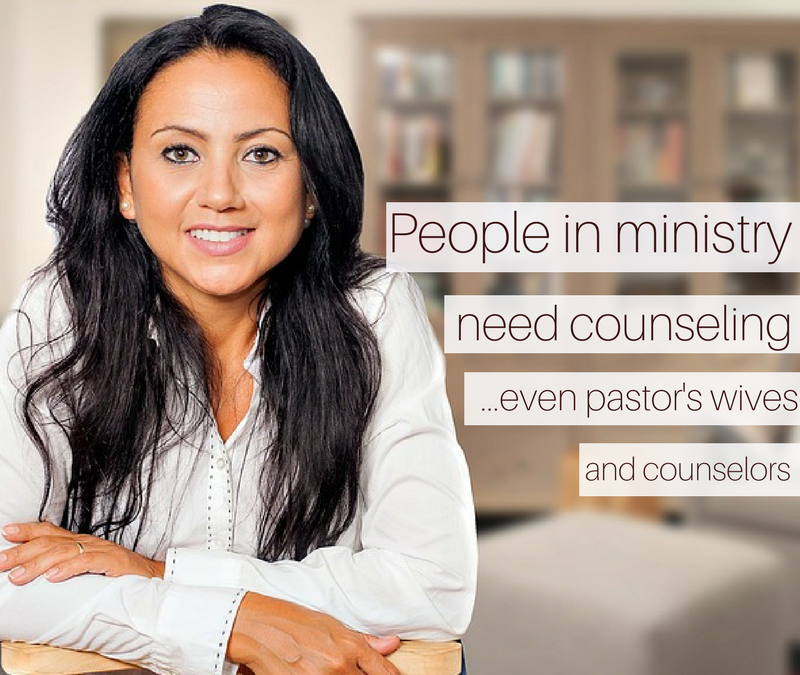
by Lucy | Apr 5, 2018 | Counselor Resources, relationships
People in ministry need counseling too, right? But some are reluctant to get it. Even pastor’s wives, biblical counselors, Bible study leaders, and so on. Here’s biblical encouragement for you. By guest writer Eliza Jane Huie.

“Is there a back door?”
The question was not only unexpected but also a bit bewildering. The caller was confirming her counseling appointment and wondered if there was a less conspicuous entrance she could access. She went on to explain that her husband was a pastor of a church in the area. This is one reason she was afraid to be seen coming into a counseling office.
This desire for anonymity didn’t have to do with our counseling center. She shared how we came highly recommended. And it didn’t have to do with any high-profile situation or scandal. It had everything to do with the fact that she felt shame from the reality that she, a pastor’s wife, was needing counseling.
Shouldn’t people in ministry — and especially the pastor’s family — have it all together? Shouldn’t she be the one doing the counseling? And what if her husband were to join her for a session? Would they ever be able to conjure up a good enough reason to quiet the barrage of suspicion that might be raised?
A back door seemed the easiest answer.
The Shame of Needing Care
The caller is not alone in her fears.
Click & Tweet!
Indeed, many people in ministry, including some biblical counselors, go without care simply because of a common misconception that they should “have it all together.” How can a pastor, pastor’s wife, ministry leader, missionary, or the like be competent for ministry if they need counseling? People under their leadership might ask this question. It is a question that, like the caller, may bring shame.
The concern isn’t fully without merit. Certainly there are things that can cause a pastor or leader to need to step away, but just because people in ministry are seeking counseling doesn’t mean that they are dealing with that kind of a situation. This stigma may keep them or their family from getting the care they need.
Click & Tweet!
Hope-Sustaining Help
I have had the privilege to care for several people who are either directly in ministry or part of a family in ministry. So I know how providing a safe and confidential place to process life can be incredibly valuable for people in the ministry spotlight. Counseling has been an infusion of sustaining hope to those who find themselves facing personal trials amidst the call to ministry.
I read a personal story of one pastor who benefitted greatly from taking the advice that he had given countless times to people sitting in his office. “Set up an appointment with the counselor I’ve suggested to you. You need safe ears—someone with years of experience who doesn’t know you as well as I know you.” Taking this step himself changed his ministry. His only regret was not doing it sooner. It is now the advice he shares will those entering the ministry.
Encouraging Counseling for People in Ministry
If that is the case why would we ever want a stereotypical stigma to get in the way of anyone getting this care? In fact, people in ministry are more energized for ministry when they are also cared for. Since this is the case, shouldn’t churches and ministry organizations encourage this for those in leadership and their family members? This is the “putting on your oxygen mask first” concept encouraged by those with years of experience in leadership.
I personally know a church that leads the way in breaking this stigma by providing 10 counseling sessions to anyone on their staff. No strings attached. Ministry leaders can take advantage of this at their own discretion.
Another ministry I’ve worked with provides mandatory counseling sessions at their yearly leaders’ retreat. The counseling was provided by a trusted third-party team of biblical counselors. It provided confidential space for leaders to share their heart without judgment. Since everyone at the retreat had a complementary session scheduled into their retreat time, nobody was singled out. By introducing this avenue of care in this way, it broke the ignominy that can accompany leaders or their families when they seek counseling.
Step Toward Help Today
The woman looking for the back door that day ended up coming to our counseling center for the next six months. By finding a place to work through her struggle she found new ways of processing and understanding her circumstances. And even better, she found fresh hope in her ministry role as a pastor’s wife. She never used the back door (though that was the subject of a couple of our counseling sessions). What is even better she now feels no need to even ask for it.
If you are in ministry or leadership (or are a biblical counselor), you shouldn’t be ashamed to get the help you need. Whether it is dealing with a significant crisis or even processing the everyday realities of ministry life, you will flourish when you are cared for. Take the step today and contact a trust faith-based counselor who can walk with you in the midst of your ministry calling.
Do you need help finding a biblical counselor?
On Heart2Heart Counselor Directory, you’ll find female biblical counselors by state and specialty. Almost all of them also offer counseling by Skype or other online option. Check out Heart2Heart Counselor Directory here. (If you’re a counselor and would like to be listed on Heart2Heart, simply fill out this form. A basic listing is free.)
Biblical Counseling Center offers complimentary counseling to pastors and their families. Contact BCC here.
Also, the Biblical Counseling Coalition, the Association of Biblical Counselors, and the Association of Certified Biblical Counselors all have connection pages to help people find a counselor near them. You can also contact the Christian Counseling and Education Foundation.
 About Eliza Huie
About Eliza Huie
Eliza Huie is the Executive Director at Life Counseling Center, a biblical counseling ministry in Ellicott City, Maryland. She has a Master’s in counseling, advance certificates from CCEF, and holds a graduate license in counseling. She is the author of Raising Teens in a Hyper-Sexualized World and Raising Kids in a Screen-Saturated World (released Spring 2018).
Counseling Hearts to Hope,

by Lucy | Apr 2, 2018 | biblical counseling, emotions
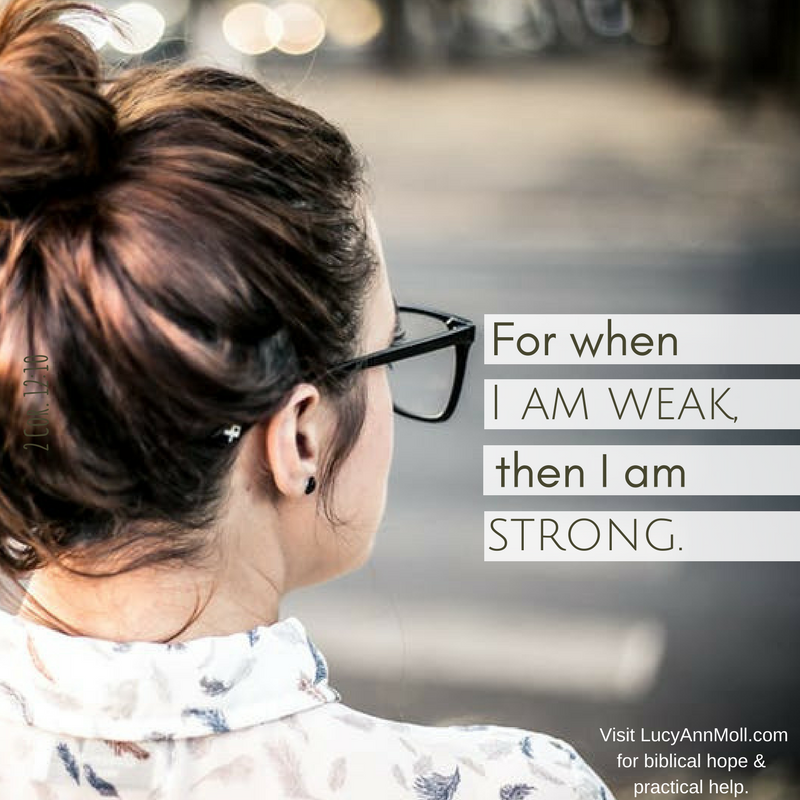 Powerful Promises: When hardships happen — and they will — God provides a pathway for you to endure them and escape temptation to sin.
Powerful Promises: When hardships happen — and they will — God provides a pathway for you to endure them and escape temptation to sin.
Let me share several powerful promises in 1 Corinthians 10:13. I pray it helps you gain 4 insights:
- Hardships are unavoidable.
- You are not alone.
- God is faithful.
- You have a way out.
Here’s the verse penned by the apostle Paul:
No temptation has overtaken you except what is common to mankind. And God is faithful; he will not let you be tempted beyond what you can bear. But when you are tempted, he will also provide a way out so that you can endure it.
Now let’s see these powerful promises.
Harships Happen
Right off, you can see that you will face hardships and temptation in this life. This is unnerving, isn’t it? And it’s a powerful promise no one likes! The term translated “temptation” in New Testament Greek carries the sense of temptation to sin or of trial to test and strengthen your faith.
For the sake of Christ, then, I am content with weaknesses, insults, hardships, persecutions, and calamities. For when I am weak, then I am strong. 2 Corinthians 12:10
Yes, you can count on hardships. Read 2 Corinthians 12:5-10. But what’s most important is how you handle them.
You Are Not Alone
Others have faced temptations and trials too. Throughout the bible you can read stories of those who’ve been rejected, harmed, abused, or tormented, and so on. Some have hungered. Others thirsted. Still others wanted to die.
Romans 15:4 provides encouagement:
For whatever was written in former days was written for our instruction, that through endurance and through the encouragement of the Scriptures we might have hope.
There truly is a purpose in your pain. Others have walked the path you’re on now; foremost, Jesus himself.
God Is Faithful
“God is faithful” — these are my favorite three words in 1 Corinthians 10:13. I am reminded, and remind my counselees, that God is caring and mighty and perfect. Nothing surprises him. He is with you in your hardship whether it is dealing with panic attacks or enduring depression or a difficult marriage.
But get this: How you handle your hardship is critical.
Click & Tweet!
When you handle your problems as God instructs, you’ll not only survive, you’ll be better off because of them.
I am reminded of my temptation to wallow in self-absorbed jealousy when life doesn’t go my way but she (whomever “she” is) has the perfect life (or at least how it looks on Facebook!). While this tempation dogs me from time to time, God has faithfully showed me his way. Now every time my thoughts begin to trip me in the comparison trap, I remind myself that I am already amazingly blessed and that I have everything I need in Christ. Having this action plan to take my eyes off myself and onto Jesus, I think of his powerful promises.
You Have an Escape
Among his powerful promises is “a way out.” But a way out from what? From the hardship? No. Another biblical counselor reminded me that God’s powerful promise is a “way out” of a sinful response to temptation. It is not a way out of the hardship.
God provides a pathway to escape sin in the midst of hardships and trials and temptations.
Click & Tweet!
Real quick, let’s move to verse 14: “Therefore, my dear friends, flee from idolatry.” This “therefore” connects the verses 13 and 14.
So God’s powerful promises provide a pathway for you to endure hardship and escape sin. Yes, hardships happen. But you are not alone. God is faithful and he provides a “way out.” As you choose to believe these powerful promises, you’ll draw near to Jesus and continue to seek his answers.
Counseling Hope to Your Heart,


 If you hope to gather information about women and porn, you might Google “women and porn” or choose a variation: porn use among women, statistics on women addicted to porn, and so forth. And you’ll get very few hits.
If you hope to gather information about women and porn, you might Google “women and porn” or choose a variation: porn use among women, statistics on women addicted to porn, and so forth. And you’ll get very few hits. At the end of June I have three talks at Briarwood Summer Counseling Conference: “Trending Issues in Biblical Counseling.” One talk is on self-injury (i.e., cutting and other forms of self-mutilation). And another is on freedom from panic attacks. The third is “Breaking the Bondage of Pornography” (a women only talk). There’s a similar talk for pornography and men.
At the end of June I have three talks at Briarwood Summer Counseling Conference: “Trending Issues in Biblical Counseling.” One talk is on self-injury (i.e., cutting and other forms of self-mutilation). And another is on freedom from panic attacks. The third is “Breaking the Bondage of Pornography” (a women only talk). There’s a similar talk for pornography and men.






 About Eliza Huie
About Eliza Huie Powerful Promises: When hardships happen — and they will — God provides a pathway
Powerful Promises: When hardships happen — and they will — God provides a pathway
